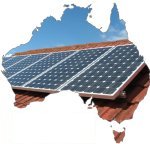The “solar is for the urban rich” myth has been dead and buried for a while and a new study will ensure it will continue to be so.
According to a report prepared by Green Energy Trading for the REC Agents Association (RAA), as income levels increase, uptake of solar power systems declines. Suburbs with the highest penetration of solar panels in each Australian state tend to be either regional or outer metropolitan areas.
Rural and regional areas host 42 per cent of all solar power systems installed in Australia, translating to an uptake rate of 29 per cent. Uptake rate in capital cities is around the 18 per cent mark.
The top 5 areas in Australia for solar uptake are:
– Bundaberg area, QLD
– Mandurah area, WA
– Hervey Bay area, QLD
– Werribee area, VIC
– Hoppers Crossing area, VIC
The report says in almost all cases, the top 10 postcodes in each state had an average taxable income lower than the state average.
“Five million Australians have embraced solar because it protects their families from soaring power bills,” said Ric Brazzale, RAA President.
“RAA’s study reinforces the importance of the Renewable Energy Target to lower income families and people living in rural areas.”
However, the future Renewable Energy Target – which provides support for the purchase of systems – is under threat. Australian Solar Council CEO John Grimes believes the current review is heading to a biased and predetermined outcome.
Energy Matters’ Australian Solar Index shows solar to still be one of the best investments in Australia. Matching up several of the top 5 areas in the RAA report with estimated average internal rate of return reveals the following.
– Bundaberg : 19.2% IRR
– Mandurah: 18.1% IRR
– Hervey Bay: 18.7% IRR
The full RAA/Green Energy Trading report, “Postcode And Income Distribution Of Solar”, can be downloaded here (PDF).












































